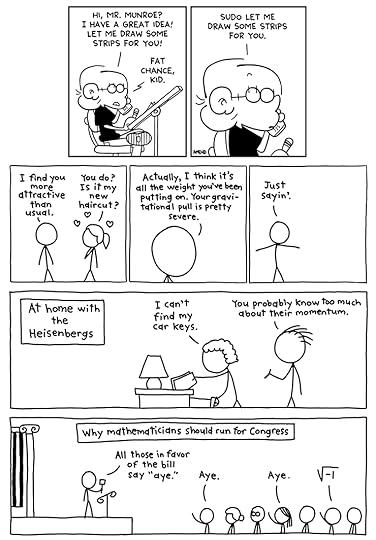Michael Flynn's Blog, page 61
December 2, 2010
Stop the Presses!
An especially clueless atheist has discovered that a Catholic hospital endorses, well, Catholicism.
In a blog post, he whines: I am a strong atheist by definition, and I have a great job and love my profession except I feel completely stifled at work. I work for a private catholic hospital and they REALLY push religion down our throats as well as those that use the facility. There are pamphlets lying around everywhere about coming to christ and how the "good" lord will solve all the problems of the word-including the sick and dying patients. They broadcast a prayer twice a day and each time I hear it I simply become angry.
Another thing that has happened recently is they have begun blocking internet sites that I visit frequently eg; IIDB, as "Alternative religion/ Occult" and so on. REALLY?? They profess a freedom from religious discrimination and promote the "spiritual growth" of employees yet they block sites that are not in agreement with Christianity. I would love nothing more than to bring this as a grievance but I fear I would lose my job for some other lesser reason if I were to do so.
They leave pamphlets lying around? Oh, the humanity! And prayers! OMG! (Oops) If this sort of thing (at Catholic hospital) makes him angry, let's not let him near any sharp instruments, let alone small arms. And just think: his employer doesn't want him doing any personal surfing on their equipment.
But the part that is most frightening is this one:they REALLY push religion down our throats as well as those that use the facility.
Do they really shove the patients down their throats? Isn't that androphagy or something?
The solution, of course, is that he go to work at an atheist hospital, such as the Repair Shop for Meat Robots. The he can leave brochures explaining that all life is a meaningless struggle against the darkness, and twice a day remind people that their minds do not really exist.
The On-going Collapse of the Modern Ages
The on-going redefinition of marriage continues now with an Australian man who has married his pet dog:
"Puppy Love: Man Marries a Real Dog"--headline, Toowoomba (Australia) Chronicle, Dec. 1
In perhaps a first for the Garden City, Laurel Bank Park hosted the wedding of Joseph Guiso and Honey, a labrador he adopted five years ago.
Thirty of the couple’s closest friends and family were in attendance for the emotional ceremony, held at dusk.
"You’re my best friend and you make every part of my day better," Mr Guiso’s vows read.
The couple decided on the location – and to tie the knot - after stumbling upon a wedding in Laurel Bank Park during an afternoon walk.
"I said that could be us," Mr Guiso said.
"She didn’t say anything so I took that as a yes."
That "perhaps a first" was a nice touch. It's not clear if the bride's age is an issue under Australian law. Nor is it clear how many of the wedding guests were from the bride's side. But one imagines a sordid possibility in which a smooth-talking seducer, waving a porterhouse steak before Honey, entices her to leave her husband and get a divorce. Would the she be entitled to a share of Mr. Guiso's property? What if Mr. Guiso feeds another dog? Would that constitute unfaithfulness? If the marriage is not consummated, can it then be annulled? The mind boggles!
OK. No it doesn't. But that's because everyone knows (except perhaps Mr. Guiso) that this is not a real marriage. There are no potential offspring to protect; no family alliances. It is only play-marriage, one more example of how the Post-Modern Age's use of the forms of Modern institutions without adopting the matter of the institution. And form without matter is not substantial.*
And isn't the emptying out of the substance of marriage the whole point?
(* form without substance. For another example, consider how Late Modern dictatorships and tyrannies employ the forms of democracy - elections, plebiscites, parliaments - without the substance.)
November 28, 2010
Breaking News
Recently, the Pope said in an interviewThere may be a basis in the case of some individuals, as perhaps when a bank robber uses an unloaded gun, where this can be a first step in the direction of a moralization, a first assumption of responsibility, on the way toward recovering an awareness that not everything is allowed and that one cannot do whatever one wants. But it is not really the way to deal with the evil of bank robbery. That can really lie only in a humanization of economics.
Oh, wait. What he said was this:
The Late Modern Age, which is focused as always on technology, instrument, and consequence can't see beyond the condom. But the condom is not a bad thing per se. It is not haram or treff or anything like that. Traditional Christianity is orthodox, not orthoprax; and this means a different attitude toward inanimate objects.
So what did the B-16 say? Take a look at the first paragraph above and ask if that implies some sort of approval for brandishing weapons "in some cases" during a bank robbery (let alone approval of bank robbery). No, what the pastiche says is that a bank robber who uses an unloaded gun is showing signs of a first, halting step toward moralizing his economic transactions. While one cannot approve of the bank robbery or the gun-brandishing, it does show that the person (not the inanimate object) has demonstrated some degree of concern for the well-being of others beside himself. Not everyone holds concern for others in high regard (see previous post), and so they have difficulty seeing this as the point; and so, there is nothing left to see but the use or non-use of the inanimate object.
For those interested in the full context of this interview, which seems to have lots of ill-informed folks abuzz, esp. those unaccustomed to critical analysis, see here and scroll down to AIDS and Condoms. The meaning should be quite clear.
November 27, 2010
The Reason for the Season
in Greek is εὐχαριστία (eukharistia) or Eucharist.
There is a school of thought in the US, often called "rugged individualism" in which the individual (envisioned as "rugged", usually male and adult) claims that he stands in a grand and solitary isolation, owing no-but nothing to no one. He is under no obligation to others, and words like altruism, generosity, charity, and so forth are hurtful to his ears.
This is nonsense, of course.
As an SF writer, Heinlein naturally focused on the technical, but the matter runs deeper. The rifle, after all, may have well been purchased and the argument could be made that the individual is in no further debt to the gunsmith. Insofar as economics (in the restricted sense) runs, that may be sufficient. But the rugged individual has nonetheless been gifted with an unbearable range of goods: from the language he speaks to the culture in which it is spoken, from the laws which govern his contracts and his morality to his very life and limb. All of these were gifts freely given and inherited without any merit on his part. He has done nothing to deserve these things, and to show a lack of gratitude or thanks is at best blind and at worst churlish. Heinlein was fond of the expression "pay it forward," which is as nice an expression as any of the debt we owe to others.
Rosy-fingered dawn, crimson sunset; a landscape of clouds; a sky filled with stars; wild violets on the meadow; the cries of children echoing through the neighborhood; a touch of snow on Thanksgiving morning; being vertical and above ground one more day; breakfast with your father or (if you are so fortunate) your mother; a clasp of hands; a good friend - or even a good enemy; work to do; difficulties to overcome; the inverse square law.
There are reasons enough for Thanksgiving, for Εὐχαριστία, that it seems mean to do so only one day a year.
Maybe we could do it every week.
November 25, 2010
Smackdown
Much of the following is due to a fascinating essay at The Renaissance Mathematicus entitled Galileo’s great bluff and part of the reason why Kuhn is wrong.
An abiding puzzle for many is: why were the physicists and astronomers opposed to Galileo's Copernicanism? Most of his supporters were "Renaissance men," i.e., artists and men of letters who took a dilettante's interest in science. There were some physicists who famously refused to look through the newfangled telescope. This while the Jesuits were making significant telescopic investigations of their own; and were in fact teaching the Copernican calculation methods at the Roman College.
Much of the confusion, imho, comes from looking at history backwards instead of forwards. Backwards, meaning looking from the present into the past, and so looking with foreknowledge of what came after and often with the unexamined assumptions of the Late Modern Ages. But one achieves a better understanding by looking at history from its own past, and not allowing knowledge of next year to affect the view of this year.
This also explains Bellarmine's instruction to Galileo, the teaching of Copernican calculations by the Jesuits, and Osiander's preface to Copernicus' book. No one had a problem with a mathematical system. The question was whether it was physically real. There was the revolution in astronomy: the notion that a set of equations that worked well meant that the world actually ran that way. It seemed to the Aristotelians to be rank Pythagorean number mysticism!
Beside, the Ptolemaic calculations worked pretty well already. They were sometimes off, but that was at least as much due to the quality of the data as to the system itself. The data they were using - the old Toledan tables and so forth - had become corrupted over the years by copyist errors. (Another modern unexamined assumption - the nature of the manuscript culture versus the printed book culture.) So the Ptolemaic system was not adding epicycle upon epicycle to correct errors ad hoc, nor teetering on the brink of collapse.
There was a problem in that Ptolemaic astronomy conflicted with Aristotelian physics. There was no room in Aristotle's physical explanation of motion for all those epicycles, let alone for the equants and descants. They would play royal hob with the crystalline spheres, for one thing. Everyone lived with the contradiction the way we live with the contradiction between Relativity and Quantum Theory. (Each provides an estimate of the Cosmological Constant -- but they differ by orders of magnitude.)
Another thing to keep in mind is that there were more than two contenders in the contest for System of the World - and the Copernican was neither obviously better, nor did it win in the end. There were two systems from ancient times:
1. Ptolemaic system: geocentric, stationary earth. Worked out in great detail by Ptolemy in his Almagest [title from an Arabic translation]. It was surprisingly accurate, as noted. Relativity theory tells us that the choice of frame of reference is arbitrary, so it is no less true mathematically than any other frame. As mentioned, the astronomical data was corrupted over the centuries, as errors crept into the data through the process of copying and translating astronomical manuscripts.
2. Heracleidian system. geoheliocentric, rotating/stationary? earth. The two inner planets, Mercury and Venus, circle the Sun, while the Sun along with the other planets, Moon, Mars, Saturn and Jupiter, circle the Earth. This is actually physically true except for the stationary part! Draw the orbit of the earth. Now draw the orbits of Moon, Mars, etc. They all enclose the Earth's orbit. Now apply the principle of relativity and designate Earth as the center of the reference frame. The Sun goes around the Earth. Problem: only a few fragments of Heracleidus Ponticus survive. It's possible the system attributed to him by the Late Classical/Early Medievals like Macrobius were over-reading the actual evidence.
BTW: Why did Heracleides, Aristotle, Archimedes, Ptolemy and other very smart people put Earth in the center of the reference frame?
Ans.: They were making all their observations from the Earth.
Pythagorean note: Some ancients like Aristarchus of Samothrace were said to have proposed a true heliocentric system. But there is no direct evidence for this. No relevant writing of his survives. Archimedes relates that he has the earth going around the sun (which is silly, right?) but no statement that he has the other planets doing so. The Pythagoreans held that the sun was a big bronze mirror reflecting an unseen and unseeable Central Fire. Later, some held the sun to be the Central Fire. The Central Fire went in the center because i) fire was nobler than earth and ii) the center was a nobler position. Ergo... There are many names for this, but science, observational astronomy, and mathematics are not among them. There do not seem to be any astronomical tables developing this system the way Ptolemy developed the stationary geocentric system.
And then there were five more models in Early Modern Times.
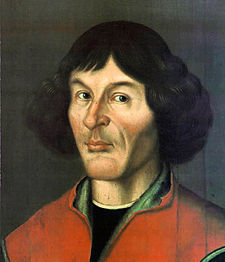 3. Copernican system [1514]. heliocentric, rotating earth, circular orbits. This system had more epicycles than Ptolemy, and not notably simpler. It produced less accurate results in some cases, partly because it relied on the same inaccurate tables. It predicts that Venus would have phases. Copernicus knew of Aristarchus, but had to develop the mathematical system himself. He needed the epicycles because he was trying to use circles for the orbits.
3. Copernican system [1514]. heliocentric, rotating earth, circular orbits. This system had more epicycles than Ptolemy, and not notably simpler. It produced less accurate results in some cases, partly because it relied on the same inaccurate tables. It predicts that Venus would have phases. Copernicus knew of Aristarchus, but had to develop the mathematical system himself. He needed the epicycles because he was trying to use circles for the orbits. 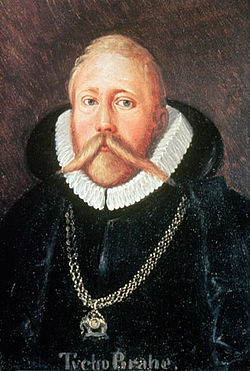 Tycho Brahe, the Imperial Astronomer then began a program of creating new tables based on meticulous modern observations. [Still no telescopes, remember]. Nicholas Reymers Bär, known as "Ursus," visited and allegedly copied Tycho's work and published first, leading to a major feud with Kepler caught in the middle. Kepler went to work for Tycho.
Tycho Brahe, the Imperial Astronomer then began a program of creating new tables based on meticulous modern observations. [Still no telescopes, remember]. Nicholas Reymers Bär, known as "Ursus," visited and allegedly copied Tycho's work and published first, leading to a major feud with Kepler caught in the middle. Kepler went to work for Tycho. 4. Tychonic system [1587 et seq.] geoheliocentric, stationary earth. Everything revolves around sun, which revolves around Earth/Moon. Modeled on Heracleidian system. It predicts that Venus would have phases.
5. Ursine system [1587 et seq.] geoheliocentric, rotating earth. Created by Nicholas Reymers Bär, known as "Ursus." Everything revolves around sun, which revolves around Earth/Moon, and the earth rotates. That is, same as Tycho's except for rotation. It predicts that Venus would have phases.
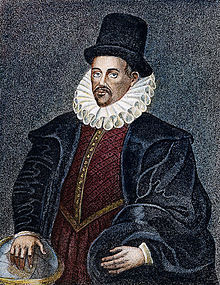
6. Gilbertine system [1600] geocentric, rotating earth. Created by William Gilbert of magnetism fame. This was very popular, and when pure geocentrism was abandoned led many to adopt Ursus rather than Tycho. For some reason, astronomers seemed more open to a rotating Earth than a revolving Earth. The lack of stellar parallax seemed to falsify the latter.
1601. Tycho dies; Kepler gets his job.
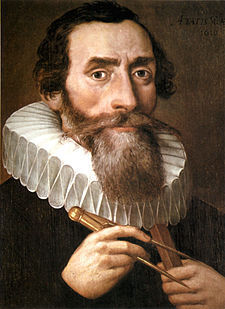
7. Keplerian system [1609]. heliocentric, rotating earth, elliptical orbits. Created by Johannes Kepler. Heliocentric. Elliptical orbits.

1610. Galileo Galilei observed the phases of Venus, thus supporting 2, 3, 4, 5, or 7. Pure geocentrism -- #1 and #6 -- was O-U-T out. This was possibly Galileo's sole original contribution to the debate. Otherwise, he merely supported pure #3 and ignored the correct model #7.
1632. Galileo Galilei published the Dialogue of the Two Chief World Systems. A very dishonest book. It presented #1 and #3 as the only two options, even though #1 had been pretty much knocked out of the contest and no astronomers were championing a pure geocentric system by then. In the book, he made no mention of the Tychonic, Ursine, or Keplerian systems. And his alleged killer proof of the Earth's rotation -- that the tides were sloshing due to the spin -- was utterly bogus. Not only did people know it had something to do with the Moon -- Heck, Aquinas knew that much! -- but it also contradicted his own argument against the Objection of the Winds.
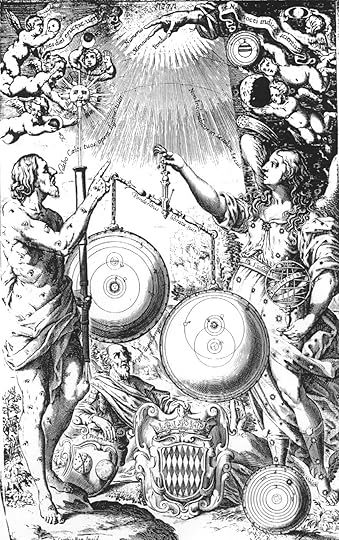
1651. Giovanni Riccioli published the Almagestum novum, the frontispiece to which shows the Copernican and Tychonic systems weighing in against each other while Ptolemy lies prostrate on the ground, though crying "I will rise again!" This was the book Galileo should have written. But because Galileo had poisoned the well with his personal quarrel, Father Riccioli was constrained to support a stationary centered earth. But look carefully at the scales on the frontispiece. (It was Fr. Riccioli who named the first craters on the Moon -- after Copernicus, Tycho, Galileo, Gassendi, Clavius, etc. He clearly saw all of them as contributing to astronomical knowledge, whichever model they had supported.
But remember: Bellarmine has simply required that the heliocentric system no be taught as fact until empirical evidence could prove it so, and so far the parallax objection still falsified the theory. (Nor does there seem to be a record of any experiment like Gugliemini's ca. 1790 for eastward deflection of falling bodies.)
The Scientific Process
The Heracleidian model was the first to go, in 1587, superseded by Tycho and Ursus.
Ptolemy and Gilbert were tossed after 1610 and the discovery of phases in Venus. Copernicus, Tycho and Ursus survive. A new contender, Kepler, has entered the fight.
Kepler worked for Tycho and succeeded to Tycho's job in 1601 when Tycho died. Much of Kepler's work was started under Tycho's direction, using Tycho's more accurate observations in place of the error-filled tables Copernicus had used. (All of this before the telescope.) His Astronomia Nova was delayed over copyright hassles regarding use of Tycho's data.
The Copernican system faded away in the face of the superiority of Kepler’s elliptical system. By the early 1630s only three systems were left:
a) Kepler’s
b) Tychonic systems without diurnal rotation.
c) Tychonic systems with diurnal rotation. [Ursine]
"At this point in the contest the Tychonic system with diurnal rotation was well ahead on points. This is the point at which Galileo published his Dialogo in which he presents a contest between the Copernican and Ptolemaic systems blithely ignoring the fact that both were effectively already out of the running. His book proved popular amongst literati who were not astronomers who enjoyed his very obvious polemic writing skills but contrary to popular opinion it didn’t play a significant role in the contemporary scientific discussion."
But how to choose between Kepler and Ursus/Tycho? All three predicted the phases of Venus; all three gave accurate predictions of the planets. The math was simpler for Kepler and two of his three "laws" were generally accepted. The "equal area" law seemed more weakly grounded. What was needed was an overarching physical theory that would make sense of one or another model. Mathematical simplicity was not a good reason for preferring one model over another. That is rank number mysticism. Tychonic/Ursine models remained popular into the 1660s. Newton's universal gravitation [1679] finally put paid to them, as there was no similar physical theory that would account for geo-heliocentric systems.
Wikipedia states: "Within Kepler's religious view of the cosmos, the Sun (a symbol of God the Father) was the source of motive force in the solar system. As a physical basis, Kepler drew by analogy on William Gilbert's theory of the magnetic soul of the Earth from De Magnete (1600) and on his own work on optics. Kepler supposed that the motive power radiated by the Sun weakens with distance, causing faster or slower motion as planets move closer or farther from it."
Not a bad guess. There is a nascent notion here of universal gravitation, although religion and analogy seems to have played a primary role in developing it.
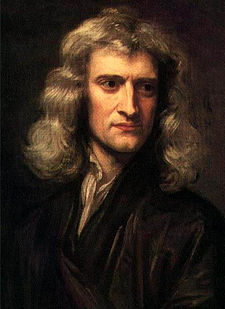 Newton finally came up with a theory that was relatively simple and from which the Keplerian system popped out as a consequence. This did not answer the empirical falsification -- stellar parallax -- but by then everyone assumed that the stars must be farther away than the ancients, Arabs, and medievals had measured, and therefore the parallax must be very small. They were right; but they assumed it. They didn't prove it. Science does not mean guessing right.
Newton finally came up with a theory that was relatively simple and from which the Keplerian system popped out as a consequence. This did not answer the empirical falsification -- stellar parallax -- but by then everyone assumed that the stars must be farther away than the ancients, Arabs, and medievals had measured, and therefore the parallax must be very small. They were right; but they assumed it. They didn't prove it. Science does not mean guessing right."Even following the publication of Newton’s Principia we still don’t have a single, dominating. unchallenged model. Both the Cartesians and the Leibnizians challenged Newton’s model because it was not mechanical (with its action-at-a-distance concept of gravity). The Cartesians fought a rearguard action supporting Descartes’ vortex system against Newton’s gravity until deep into the 18th century. Leibniz challenged Newton’s assumption of absolute time and space, proposing a relative system instead; a challenge that would with time lead to the refutation of Newton’s system..."
It turned out Newton was wrong about both the nature of gravity and the absoluteness of space and time. See Einstein for details.
For a discussion of Galileo's place in the scheme of things, history of science-wise, see Pulling Out the Stopper.
November 24, 2010
November 23, 2010
A Musical Moment
While driving back from the Doctor's office, Bob Gibson came up on the satellite radio channel for folk music. There is just something about this song that gets me. The video below is nothing, but the singing is credited to Shel Silverstein, Bob Gibson, and John Hartford.
November 22, 2010
Life Among the Skiffoids
This weekend was Philcon. It was curiously small, and I heard this attributed to the Con Committee not sending out Program Participation invites until three weeks before the Con itself. In any case, there were very few pro writers. I saw Bud Sparhawk, Tom Purdom, and Gardner Dozois. I suppose fantasy writers and gamesters were thick as ticks on a hound dog's back, but on panels I saw they introduced their oeuvre with the names of small publishers. Some were impressive nonetheless. A twelve-book series of YA fantasy is no mean accomplishment. But the SF content seems to be getting thinner each year.
One fellow had an interesting talk about the Apollo Guidance computer. He had one, discussed the programs, the primitive nature of the hardware and the architecture lo these many years later.
My own adventures ran as follows.
Naturally, in skiffydom, the desire for these other intelligences outweighed any serious rational analysis. We want our wise old dolphins or in one case New Caledonian crows. The primary confusion lay with the very idea of "intelligence" of course. Since science fiction is really technology fiction for the most part, minds were already bent toward the notion that intelligence had something to do with tool-using and problem solving. One gentleman remarked that we used to think that tool-using marked humans as different, until tool-using animals were noted. Then the difference became tool-making, until tool-making animals were noted. Oh, those animals. They are surely on the verge of revealing their wisdom to the rest of us.
Lacking the wisdom of Aristotle - who never made the error of confusing the human/animal distinction with tool-using of any sort - the panel and audience constantly shifted among "intelligence", "problem solving", "sentience", "emotion/empathy", and a number of other things thought to be markers of this elusive property.
I therefore introduced them to the wisdom of Aristotle, blinding them with erudition, etc. They all nodded -- and then returned to the earlier confusion of concepts.
For non-Aristotelians among my faithful reader, the distinction is simply that between imagination and intellect. Perception of concrete particulars and the ability to remember and to manipulate those memories can create wonderful feats on the part of animals. It's what makes them trainable. But the intellect abstracts from concrete particulars to universal concepts. A sheep may perceive a wolf and act accordingly, but when there is no wolf present, the sheep do not get together and discuss what they might do should a wold ever appear.
For those who are curious, the following is a nice summary of the Aristo-Thomist distinction, and links to some poor naive scientist's list of "human traits" that are no longer distinctly "human."
2. Does Time Travel Allow for Free Will? The panel title tells it all. It is exactly backward. The question is properly Does Free Will Allow for Time Travel? I know from direct experience that I have free will. Many in the audience did not and so were evidently either automatons or random number generators. It soon became evident that few understood what free will meant, and so discussion focused on the possibility of time travel and the time travel paradoxes. The panel moderator was a quantum physics guy and he said that the math, while providing nanoloops of time travel backward, also indicates a self-corrective process that would prevent the paradox from emerging. I'll take his quantum word for it. We can build a time machine, but the quantum mechanics of it will ensure that it doesn't work. Exactly in the way that classical physics ensures that a perpetual motion machine will not work.
On the free will front, I explained the Aristotelian position: the will is an appetite for the products of the intellect, and the intellect is therefore prior to the will. I gave the parallel with the perceptions of the senses and the emotions (or sensitive appetites). The will is necessarily free because the intellect does not know perfectly. I asked how many wanted world peace. Most raised their hands, causing some worry regarding the others. But when questioned, most admitted they did not know what world peace would look like or how it would be achieved. Since you cannot desire what you do not know, the will is free to choose various means to the end. That's all free will means, after all. It doesn't mean muscular motions, or random choices, or unpredictable choices. For more detail see a previous essay:
3. Continuing Series. This was where I encountered the lady with the 12-book YA series. I talked about the Firestar and Spiral Arm series and how you dealt with continuing character growth, cumulative plot development, backstory, etc. There really are no single right answers, although there are many wrong ones. The basic distinction in the taxonomy is: the on-going saga of... versus the really long story arc. The former is episodic, with the characters undergoing only modest changes - think Sherlock Holmes - and is open ended. Much detective fiction is of this sort. The latter is envisioned as finite with a completely developed story running through a possibly specific number of books. In it, the characters grow and change as they encounter various story problems in each volume.
4. Can SF or F Enhance People's Religious Beliefs? I was the moderator, and a good thing, too. The answer is too obvious: No it doesn't. Few people will come away from F/SF with their religious beliefs altered in any fashion. On my left was a bioscientist who introduced himself as a born-again Christian. On my right was a guy who declared himself the president of North American Atheist Association, or some such thing. I was in between. On the far right was another free-thinker, but of more scholarly bent who said he was JRR Tolkein's first biographer. As is usual in panels like this, discussion kept veering off into the factual nature of religious beliefs. (They tended to say "truth" rather than "fact," possibly under the impression the two were the same.) Oddly, no one attacked atheism per se. Although several audience members self-identified as Christians, all of them acted like, well, Christians.
Our atheist association guy announced that SF, by presenting "other" (including fictional) religious systems, would induce readers to think critically about their own religion. Me, I think the reader would like the story, recognized a plot element as precisely that, and forget most of it after moving on to the next book. Our born again panelist stated that he welcomed critical thinking applied to religion and thought that it would strengthen religious beliefs. This engendered some scoffing, but I pointed out that, whether you agreed with their beliefs or not, the medievals had thoroughly applied logic and reason to their religion - Peter Abelard, Peter Lombard, and Thomas Aquinas being only the best known.
At some other point, the presidential atheist made some comment about the "invisible magic man in the sky." I halted discussion for a moment to point out that that was not the nature of the God the Abrahamic religions attested. He said it was too. So I said that the truth or falsity of religious beliefs was not the subject of the panel, but advised him that if he wished to disprove a religious belief he ought to at least understand what that belief was.
At another point, our born-again dude said that Christianity had invented science. This elicited howls of outrage on the part of several and shouted - shouted, mind you - denunciation of such a thought. The fellow on my right said into the hubbub that science had been invented by Christians, but not by Christianity. I wondered why he thought an abstraction could invent anything, but commented that there were certain beliefs in Christianity that facilitated the blossoming of science, but that the panel was not one on the origins of science. Someone in the audience objected that all the people of the world had discovered things about science. I countered with Poincare's dictum that a pile of stones is not a house and a pile of facts is not a science. Everyone has indeed come across facts, rules of thumb, and so forth; but this is not science, and is not the topic of the panel.
There was a comment made that religion was simply a pre-scientific effort to explain nature. This is natural to skiffy-folk. We tend to think everything is about natural science. But not everything is, and in any case it would not matter to the panel topic. Man, it was like herding cats.
My favorite comment came at the end. Our atheist friend in his final remarks advised his listeners to read all sorts of books. He mentioned Dawkins, of course, but also urged them to read the Bible - possibly he thought it would disillusion them - but he emphasized they should read it themselves without any interpretation, without any advice, etc. So my concluding remark was how much his advice resembled that of fundamentalists.
In the Lion's Mouth
The frumious Bandersnatch is slain!
It now remains to dress the carcass.
One man with a dream, at pleasure,
Shall go forth and conquer a crown;
And three with a new song’s measure
Can trample an empire down.
– Arthur O’Shaughnessy (1844-1881), “We Are the Music Makers”
Processional
Prolegomenon
First Canto: Ravn Olafsdottrs Saga
I. Riftward: The First Counter-Argument
Cengjam Gaafe: The First Interrogatory
II. Riftward: The Frog Prince
Cengjam Gaafe: The Second Interrogatory
III. Henrietta: The Dream of Agamemnon
Cengjam Gaafe: The Third Interrogatory
IV. Henrietta: The Second Counter-Argument
Cengjam Gaafe: The Fourth Interrogatory
V. Ashbanal: A Gathering of Shadows
Cengjam Gaafe: The Fifth Interrogatory
VI. Toward Yuts’ga: The Third Counter-Argument
Cengjam Gaafe: The Sixth Interrogatory
VII. Yuts’ga: A Role, in the Hay
Cengjam Gaafe: The Seventh Interrogatory
VIII. Yuts’ga: Jacques, in a Box
Cengjam Gaafe: The Eighth Interrogatory
IX. Yuts’ga: The Main Argument
Sīdáo Zhwì: The Final Interrogatory
Second Canto: Donovan buigh’s Saga
I. Toward Terra: The Synthesis
II. Dangchao Waypoint: Doggedness
III. Terra: The Pasdarm at the Iron Bridge
IV. Henrietta: And Did She Teach You Three Things?
V. Terra: One of the Pleasantest Things in Life
VI. Dao Chetty: Many Arrows Loosèd Several Ways
VII. Terra: One Man With a Dream, At Pleasure
VIII. Tungshen: Never Do What You Said You’d Do
IX. Terra: At the Capital of All the Worlds
X. Terra: The Play of the Coral Snake
XI. Terra: Hanging Tough
XII. The Secret City: A Touch of Terror
XIII. Gayshot Bo: Three, With a New Song’s Measure
Excursus
November 19, 2010
Stop the Presses
BERLIN, Nov 16 (Reuters) – Climate change could lead to colder winters in northern regions, according to a study by the Potsdam Institute for Climate Impact Research on Tuesday.
Next up: Hitting the ground could lead to more falls! Or perhaps: Breathing could lead to more respiration! Evolution could lead to different species!
Change is not a cause. It is an effect.
Michael Flynn's Blog
- Michael Flynn's profile
- 237 followers



